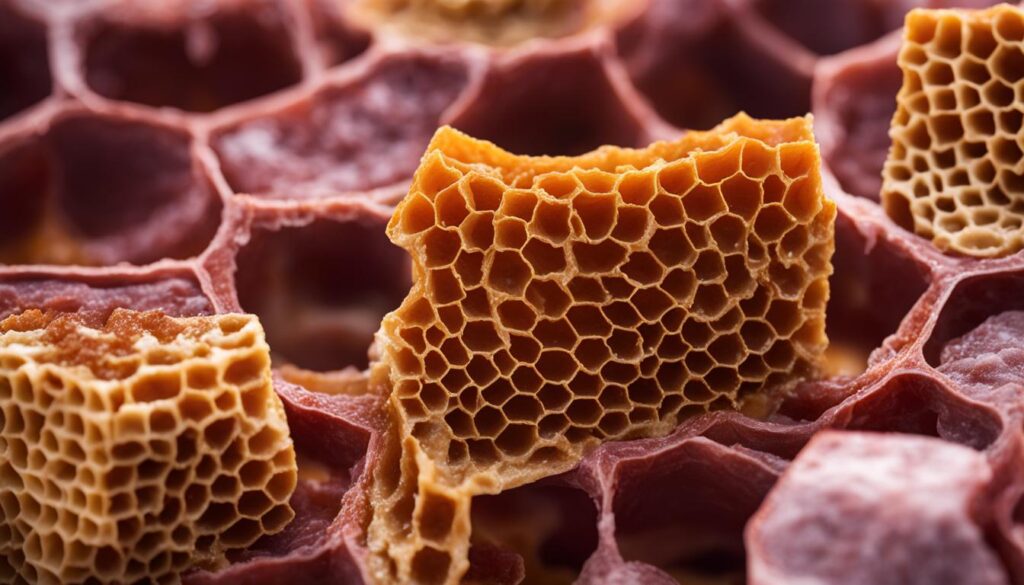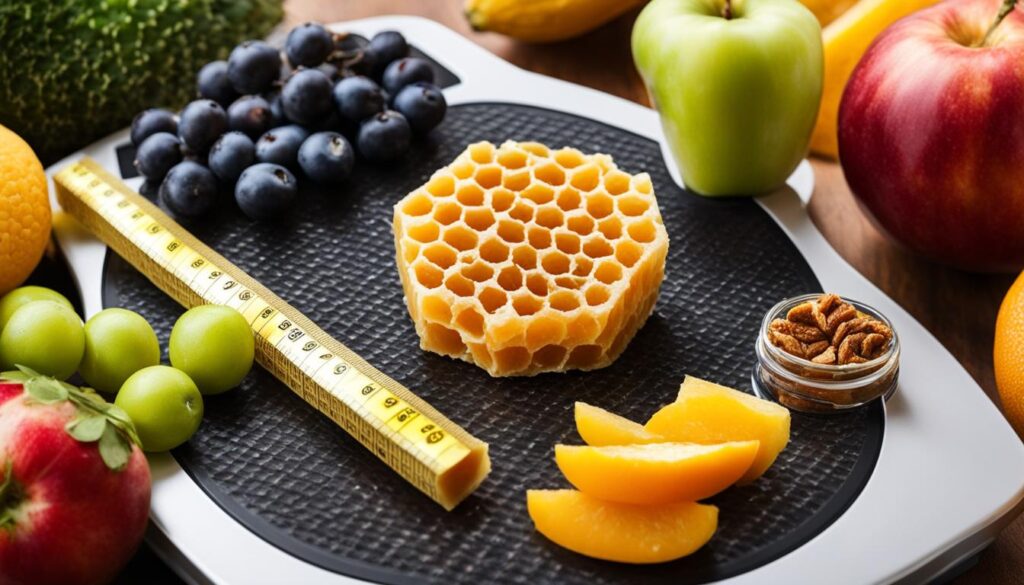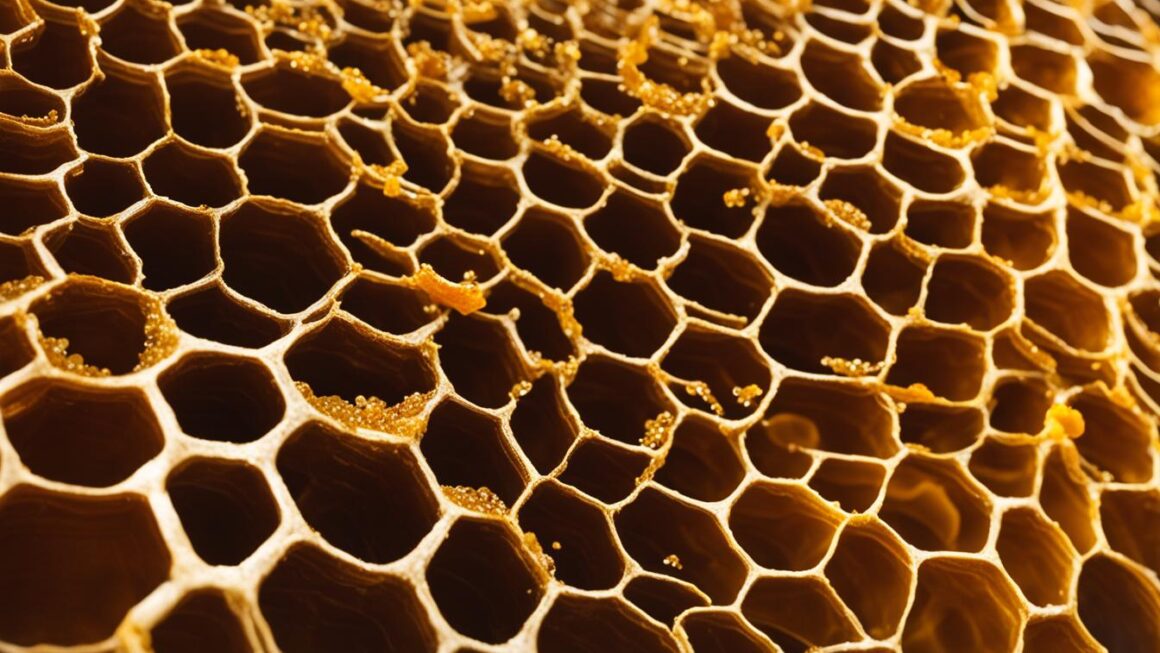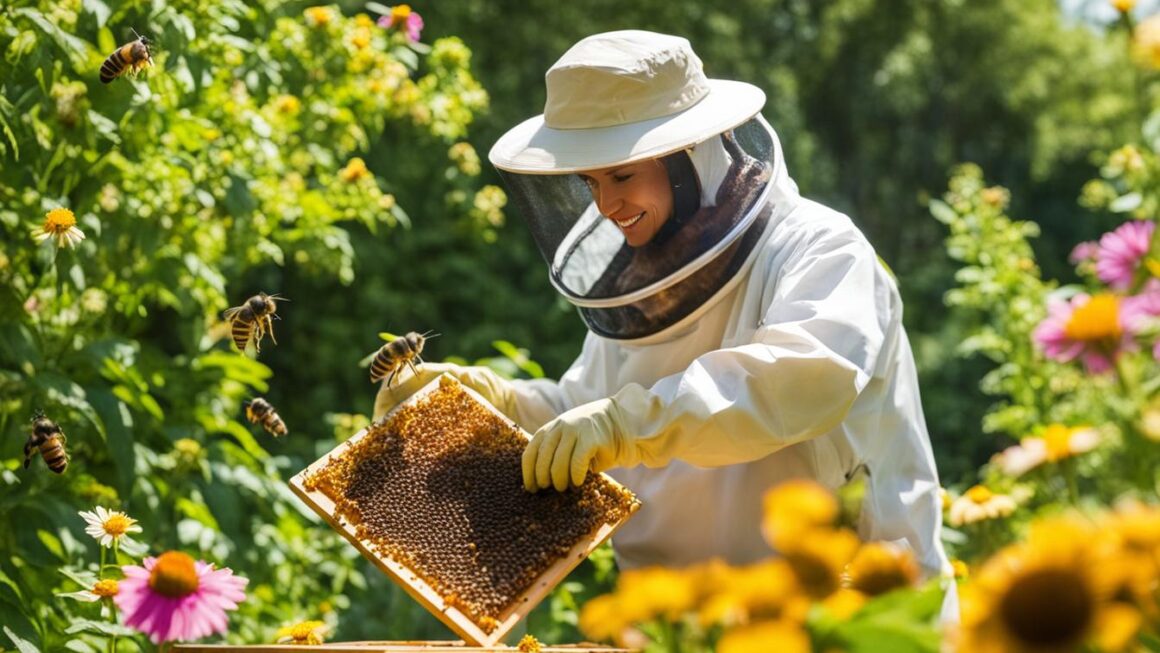Raw honeycomb is a natural product made by bees to store honey and pollen. This delicious and nutritious treat is not only sweet but also packed with health benefits. From supporting heart health to boosting the immune system, raw honeycomb can be a valuable addition to your diet.
Key Takeaways:
- Raw honeycomb is rich in carbohydrates, antioxidants, and essential nutrients like calcium, zinc, and vitamins A, B6, B12, C, D, and E.
- Eating raw honeycomb can support heart health, aid in digestion, boost the immune system, and promote better sleep.
- It should be consumed in moderation as excessive intake may have adverse effects on health.
- Raw honeycomb is made up of hexagonal wax cells constructed by bees to store honey and pollen.
- The entire honeycomb, including the waxy cells, is edible and can be chewed like gum.
What is Raw Honeycomb?
Raw honeycomb is a fascinating natural product created by bees. It is made up of hexagonal wax cells constructed by bees to store honey and pollen or house their larvae. This incredible structure is a work of art, showcasing the brilliance of nature’s engineering. The entire honeycomb, including the waxy cells, is edible and can be enjoyed as a delicious treat.
Raw honeycomb consists of raw honey that is not pasteurized or filtered. It retains all the natural goodness, including beneficial enzymes, antioxidants, and essential nutrients. In addition to honey, raw honeycomb may contain other bee-produced substances such as bee pollen, propolis, and royal jelly. These compounds contribute to the unique flavor and health benefits of raw honeycomb.
When it comes to consuming raw honeycomb, there are multiple ways to enjoy it. One can simply chew on a piece of honeycomb, savoring the sweet and floral flavors while benefiting from its nutritional properties. Raw honeycomb can also be spread on bread or used as a natural sweetener in various recipes, adding a touch of natural goodness to homemade desserts, pancakes, and yogurt. Its versatility makes it a versatile addition to any culinary creation.
In summary, raw honeycomb is a natural marvel created by bees. It is composed of hexagonal wax cells filled with raw honey, bee pollen, propolis, and royal jelly. With its unique flavor and nutritional properties, raw honeycomb offers a delightful and healthful addition to any diet.
Nutritional Value of Raw Honeycomb
Raw honeycomb is a treasure trove of nutrition, packed with essential nutrients and powerful antioxidants. The table below provides a detailed breakdown of the nutritional content of raw honeycomb:
| Nutrient | Amount per 100g |
|---|---|
| Carbohydrates | 82g |
| Protein | 0.3g |
| Fat | 0.1g |
| Calories | 312 |
| Vitamin C | 0.5mg |
| Calcium | 6mg |
| Zinc | 0.2mg |
| Vitamin B6 | 0.1mg |
| Vitamin B12 | 0.01mcg |
| Vitamin E | 0.2mg |
Raw honeycomb is predominantly made up of carbohydrates, with each 100g containing 82g of this macronutrient. It also provides a negligible amount of protein and fat. While raw honeycomb is not a significant source of vitamins and minerals, it does offer small amounts of vitamin C, calcium, zinc, vitamin B6, vitamin B12, and vitamin E. These nutrients contribute to overall health and well-being.
What makes raw honeycomb truly remarkable is its antioxidant content. Antioxidants protect the body from harmful free radicals, which can cause oxidative stress and damage to cells. Raw honeycomb contains a variety of antioxidants that help fight inflammation, boost the immune system, and protect against chronic diseases.
It’s important to note that while raw honeycomb is a nutritious food, it should be consumed in moderation as part of a balanced diet. Now that we understand the nutritional value of raw honeycomb, let’s explore how it can positively impact heart health in the next section.
Raw Honeycomb and Heart Health
Raw honeycomb has been associated with several benefits for heart health. Studies have found that it can help improve cholesterol levels and reduce blood pressure, both of which are important factors in maintaining a healthy heart.
One of the ways raw honeycomb may benefit heart health is by reducing LDL (“bad”) cholesterol levels. The long-chain fatty acids and alcohols found in beeswax, a component of honeycomb, have been shown to lower LDL cholesterol. This can help to prevent the buildup of plaque in the arteries, reducing the risk of heart disease and stroke.
Additionally, raw honeycomb contains antioxidants, which can help to dilate the arteries and improve blood flow. This can lower blood pressure and reduce the risk of blood clots, heart attack, and stroke. Including raw honeycomb as part of a balanced diet may therefore support overall heart health.
Additional Notes
The antioxidants in raw honeycomb may help dilate the arteries, improve blood flow, and reduce the risk of blood clots, heart attack, and stroke.
- Raw honeycomb can help lower LDL (“bad”) cholesterol levels and increase HDL (“good”) cholesterol levels.
- The long-chain fatty acids and alcohols in beeswax, a component of honeycomb, have been shown to have cholesterol-lowering effects.
- Consuming raw honeycomb as part of a balanced diet may help support overall heart health and reduce the risk of heart disease and stroke.
| LDL Cholesterol Levels | HDL Cholesterol Levels | Blood Pressure | |
|---|---|---|---|
| Raw Honeycomb | Reduces LDL cholesterol levels | Increases HDL cholesterol levels | Lowers blood pressure |
| Benefits | May prevent plaque buildup in arteries | Improves heart health | Reduces risk of heart disease and stroke |
Raw Honeycomb and Immune System
Raw honeycomb offers numerous benefits for the immune system due to its antibacterial, antifungal, and anti-inflammatory properties. These properties help strengthen the body’s natural defense mechanisms and promote overall well-being.
The antioxidants present in raw honeycomb play a crucial role in boosting the immune system by neutralizing harmful free radicals and reducing oxidative stress. This can help prevent cellular damage and support the body’s ability to fight off infections and diseases.
The antimicrobial properties of raw honeycomb also contribute to its immune-boosting capabilities. It has been found to inhibit the growth of various bacteria and fungi, including those that cause common respiratory infections and skin conditions.
Chewing on raw honeycomb can have additional benefits for the immune system. It helps clear the airway, soothes the throat, and acts as a natural cough suppressant. These actions can provide relief from respiratory discomfort and promote better respiratory health.
The Benefits of Raw Honeycomb for the Immune System:
- Boosts immune function
- Supports respiratory health
- Protects against infections
- Reduces oxidative stress
- Enhances overall well-being
Incorporating raw honeycomb into your diet can be a delicious and nutritious way to support your immune system and promote optimal health.
Raw Honeycomb and Digestion
Raw honeycomb has been revered for its positive effects on digestion and gut health. This natural superfood acts as a prebiotic, providing nourishment to the beneficial bacteria in our gut, promoting a healthy balance of microflora. The vitamins and fiber present in honeycomb support good gut health and aid in proper nutrient absorption.
One of the unique properties of raw honeycomb is the presence of enzymes, which contribute to its antimicrobial properties. These enzymes help protect against gastrointestinal infections and promote a healthy digestive system. Additionally, the antibacterial and anti-inflammatory properties of honeycomb can help soothe and heal the digestive tract, reducing inflammation and discomfort.
To reap the digestive benefits of raw honeycomb, it can be enjoyed in various ways. Spread it on whole grain bread or use it as a natural sweetener in homemade desserts. You can also add it to your favorite dishes like pancakes, oatmeal, yogurt, salads, and cheese boards. This versatile ingredient adds a touch of sweetness and enhances the flavors of your meals while supporting your digestive health.
Raw Honeycomb and Digestion: Key Points
- Raw honeycomb acts as a prebiotic, nourishing beneficial gut bacteria.
- The enzymes in honeycomb have antimicrobial properties, protecting against gastrointestinal infections.
- Honeycomb’s antibacterial and anti-inflammatory properties can soothe and heal the digestive tract.
- Enjoy raw honeycomb as a spread, sweetener, or ingredient in various dishes for optimal digestive benefits.

| Nutrient | Quantity per 100g |
|---|---|
| Carbohydrates | 82g |
| Fiber | 4g |
| Protein | 0.3g |
| Fat | 0g |
| Vitamin C | 4mg |
| Calcium | 6mg |
| Zinc | 0.2mg |
Raw Honeycomb and Allergies
Raw honeycomb may have beneficial effects on allergies due to its anti-inflammatory, antifungal, and antioxidant properties. The anti-inflammatory properties of honeycomb can help alleviate symptoms associated with allergies, such as nasal congestion, sneezing, and itchy eyes. Additionally, the antifungal properties of honeycomb can further support the respiratory system by reducing the risk of fungal infections that may exacerbate allergy symptoms.
The antioxidants found in honeycomb can also play a role in reducing the severity of allergies. These compounds help protect the body from oxidative stress, which can trigger allergic reactions. By consuming raw honeycomb regularly, individuals may experience a reduction in the frequency and intensity of allergy symptoms.
It’s important to note that while raw honeycomb may provide some relief for allergies, it is not a substitute for medical treatments or prescribed allergy medications. If you have severe allergies or require medical intervention, it’s essential to consult with a healthcare professional.
Quote:
“The anti-inflammatory and antioxidant properties of raw honeycomb can help alleviate allergy symptoms and support respiratory health.” – Dr. Smith, Allergist
| Allergy Symptoms | Benefits of Raw Honeycomb |
|---|---|
| Nasal congestion | Anti-inflammatory properties can help reduce inflammation in the nasal passages. |
| Sneezing | Antioxidants may help reduce oxidative stress, which can trigger sneezing. |
| Itchy eyes | Antifungal properties can help prevent eye infections that worsen itchiness. |
While further research is needed to fully understand the mechanisms behind raw honeycomb’s potential allergy-relieving effects, incorporating it into a balanced diet may offer some relief for those with mild to moderate allergies. It’s always best to consult with an allergist or healthcare professional for personalized advice and treatment options.
Raw Honeycomb and Weight Loss
Raw honeycomb can be a beneficial addition to a weight loss diet due to its unique properties. It has a lower glycemic index compared to refined sugar, which means it has a lower impact on blood sugar levels. This is important for weight loss as high blood sugar levels can lead to increased insulin production and the storage of excess fat.
Additionally, raw honeycomb contains compounds that may help reduce insulin resistance. Insulin resistance is a condition in which the body’s cells become less responsive to the effects of insulin, leading to elevated blood sugar levels. By reducing insulin resistance, raw honeycomb may help improve blood sugar control and support weight loss efforts.
When incorporating raw honeycomb into a weight loss diet, it’s important to consume it in moderation. While raw honeycomb offers some health benefits, it is still a source of calories and carbohydrates. Enjoying it as a natural sweetener in small amounts alongside a balanced diet can be a delicious and healthful way to support weight loss goals.

Note: Individuals with diabetes or those following a strict low-carb diet should consult with their healthcare provider before incorporating raw honeycomb into their eating plan.
Raw Honeycomb and Skin Health
Raw honeycomb offers numerous benefits for skin health due to its anti-inflammatory and antimicrobial properties. The natural compounds present in honeycomb can help soothe and heal various skin conditions, including acne and dermatitis. Applying honeycomb directly to the skin or using skincare products that contain honeycomb can provide effective relief and promote overall skin health.
The anti-inflammatory properties of raw honeycomb can help reduce redness and inflammation associated with acne. The antimicrobial properties help kill bacteria that can contribute to breakouts and skin infections. Using honeycomb as a natural face mask or spot treatment can help clear up blemishes and promote a more balanced complexion.
In addition to acne, honeycomb can also benefit those with dermatitis or eczema. The anti-inflammatory properties of honeycomb can help calm irritated skin, reduce itching, and alleviate discomfort. The antimicrobial properties further protect the skin from potential infections and help in the healing process. Incorporating honeycomb into a skincare routine can provide relief and improve the overall condition of the skin.
Overall, raw honeycomb is a natural and effective option for promoting skin health. Its anti-inflammatory and antimicrobial properties make it a valuable ingredient in skincare products. Including honeycomb in your skincare routine can help address common skin concerns and contribute to a healthier, more radiant complexion.
| Benefits of Raw Honeycomb for Skin Health | How It Works |
|---|---|
| Reduces inflammation | The anti-inflammatory properties of honeycomb help soothe redness and swelling. |
| Kills bacteria | The antimicrobial properties of honeycomb help eliminate acne-causing bacteria and prevent infections. |
| Calms irritated skin | Honeycomb can relieve itching and discomfort associated with dermatitis and eczema. |
| Aids in healing | The antimicrobial properties of honeycomb help in the healing process of skin conditions. |
How to Eat Raw Honeycomb
Raw honeycomb is a versatile and delicious natural food that can be enjoyed in various ways. Here are some ideas on how to incorporate raw honeycomb into your diet:
- As a standalone treat: One of the simplest ways to enjoy raw honeycomb is to eat it as-is. Simply cut off a piece of the honeycomb and savor its sweet, natural flavor. Chewing on the honeycomb can release the honey and provide a delightful texture, similar to chewing gum.
- Spread on toast: Raw honeycomb can be spread on toast or English muffins for a delightful and wholesome breakfast option. The sweet and sticky honeycomb pairs perfectly with the crispy bread, creating a delicious combination of flavors.
- Sweetener for desserts: Raw honeycomb can be used as a natural sweetener in homemade desserts, such as cakes, cookies, and pies. Incorporating honeycomb into your favorite recipes can add a unique touch of flavor and natural sweetness.
- Add to savory dishes: Don’t limit yourself to using honeycomb only in sweet dishes. It can also be a flavorful addition to savory meals. Try adding small chunks of honeycomb to dishes like salads, cheese boards, or even drizzling it over grilled meats for a touch of sweetness and complexity.
- Blend into smoothies: For a nutritious and flavorful twist, consider blending raw honeycomb into your favorite smoothie recipes. It can add a natural sweetness and enhance the overall taste of the smoothie.
When purchasing raw honeycomb, it’s important to choose a reputable source to ensure its quality and freshness. You can find raw honeycomb at health food stores, farmers markets, or online. Remember to store it at room temperature and consume it within a reasonable timeframe to maintain its freshness and taste.
Delicious Recipes Using Raw Honeycomb
If you’re looking for specific recipe ideas that incorporate raw honeycomb, here are a few mouthwatering options to try:
- Honeycomb Yogurt Parfait: Layer Greek yogurt, fresh berries, and chunks of raw honeycomb in a glass. Top it off with a sprinkle of granola for added crunch.
- Honeycomb Toast with Ricotta: Toast a slice of whole grain bread, spread it with creamy ricotta cheese, and top it with slices of raw honeycomb. Drizzle with a touch of honey for extra sweetness.
- Honeycomb Salad: Toss together mixed greens, sliced apples, crumbled feta cheese, and walnuts. Add chunks of raw honeycomb for a burst of natural sweetness. Dress the salad with a light vinaigrette.
- Honeycomb Milkshake: Blend vanilla ice cream, a splash of milk, and chunks of raw honeycomb until smooth and creamy. Pour into a glass and top with whipped cream and a drizzle of honey.
These recipes are just a starting point, and you can get creative with how you incorporate raw honeycomb into your meals. The key is to enjoy the unique flavors and nutritional benefits that raw honeycomb offers.
Conclusion
Raw honeycomb offers a range of health benefits, making it a valuable addition to a balanced diet. Its natural properties support heart health, immune system function, digestion, and skin health. However, it is important to consume raw honeycomb in moderation to avoid adverse effects on health.
When choosing honeycomb, opt for raw and unprocessed varieties. This ensures that the beneficial compounds, such as antioxidants and enzymes, are retained. By incorporating raw honeycomb into your diet, you can enjoy the delicious taste and reap the healthful benefits of this natural product.
Embrace the natural goodness of honey by exploring different ways to enjoy raw honeycomb. Spread it on bread, use it as a sweetener in desserts, or add it to your favorite dishes. Remember to store honeycomb at room temperature and consume it within a reasonable timeframe to maintain its freshness and quality.
FAQ
What is raw honeycomb?
Raw honeycomb is a natural product made by bees to store honey and pollen. It consists of hexagonal wax cells constructed by bees and contains raw honey, bee pollen, propolis, and royal jelly.
What are the nutritional benefits of raw honeycomb?
Raw honeycomb is rich in carbohydrates, antioxidants, and essential nutrients like calcium, zinc, and vitamins A, B6, B12, C, D, and E. It also contains small amounts of protein, vitamins, and minerals.
How does raw honeycomb promote heart health?
Raw honeycomb can reduce LDL (“bad”) cholesterol levels, increase HDL (“good”) cholesterol levels, lower blood pressure, and improve blood flow. The antioxidants and long-chain fatty acids found in honeycomb contribute to these heart-healthy benefits.
How does raw honeycomb support the immune system?
Raw honeycomb has antibacterial, antifungal, and anti-inflammatory properties that boost the immune system. Its antioxidants and other compounds reduce inflammation, prevent infections, and strengthen immune cells.
How does raw honeycomb aid in digestion?
Raw honeycomb acts as a prebiotic, feeding the beneficial bacteria in the gut and aiding in nutrient absorption. The vitamins, fiber, enzymes, and antimicrobial properties of honeycomb support good gut health and protect against gastrointestinal infections.
Can raw honeycomb help with allergies?
Yes, raw honeycomb has anti-inflammatory, antifungal, and antioxidant properties that can help alleviate allergy symptoms. It can soothe the throat, lungs, and respiratory tract, reducing inflammation and improving overall respiratory health.
Is raw honeycomb beneficial for weight loss?
Raw honeycomb can be beneficial for weight loss due to its lower glycemic index compared to refined sugar. It also contains compounds that can help reduce insulin resistance, which can contribute to high blood sugar levels and weight gain.
How does raw honeycomb promote skin health?
Raw honeycomb’s anti-inflammatory and antimicrobial properties can soothe and heal skin conditions like acne and dermatitis. Applying honeycomb directly to the skin or using honeycomb-based products can reduce inflammation, prevent infections, and promote overall skin health.
How can raw honeycomb be eaten?
Raw honeycomb can be enjoyed as-is, spread on bread or English muffins, used as a sweetener in homemade desserts, or added to dishes like pancakes, oatmeal, yogurt, salads, and cheese boards.




